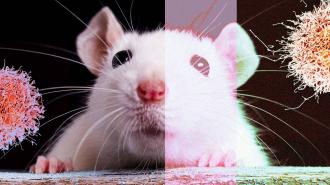Stanford scientists have developed a one-time antibody treatment that gave older mice younger-acting immune systems — and they think it could work in people, too.
“If we can revitalize the aging human immune system like we did in mice, it could be lifesaving when the next global pathogen arises,” said co-senior author Irving Weissman.
Immunity 101: Your immune system has two major parts: innate and adaptive. The innate system is your general first line of defense against threats. Its cells patrol your body all the time, looking for unfamiliar cells and triggering inflammation to help fight infection and promote healing when there’s a problem.
The adaptive system develops as you’re exposed to new germs. It learns to recognize specific threats, with specialized T cells and antibodies — this is the part of the immune system trained by vaccines.
The aging immune system: When you’re young, your stem cells generate a nice balance of innate immune cells (mainly ones called myeloids) and adaptive cells (called lymphocytes).
As you age, though, you make fewer stem cells that develop into this balanced mix of innate and adaptive cells, and more stem cells that tilt toward developing into myeloids.
“Older people were dying in larger numbers than younger people.
Irving Weissman
The increase in myeloids can lead to excess inflammation as you get older, which causes pain and damages tissues. The decrease in lymphocytes, meanwhile, can make it harder for your body to combat new infections and even respond to vaccines.
“Older people just don’t make many new B and T cell lymphocytes,” said Weissman. “During the start of the COVID-19 pandemic it quickly became clear that older people were dying in larger numbers than younger people. This trend continued even after vaccinations became available.”
Remarkable results: The Stanford researchers have now developed an antibody that binds to myeloid-leaning stem cells.
Their hope was that administering it would trigger the immune system to destroy those myeloid-biased cells and lead to the production of more of the balanced stem cells that develop into a nice mix of adaptive and innate immune cells.
“Every feature of an aging immune system … was impacted by this single course of treatment targeting just one cell type.”
Jason Ross
To see how the antibody treatment might affect an aging immune system, the researchers administered it to 18- to 24-month-old mice (that may sound young, but the average lifespan of a mouse is 26 to 30 months). The results were remarkable.
“Every feature of an aging immune system — functional markers on the cells, the prevalence of inflammatory proteins, the response to vaccination, and the ability to resist a lethal infection — was impacted by this single course of treatment targeting just one cell type,” said co-lead author Jason Ross.
The impact of the antibody treatment on the mice appeared durable, too, with dramatic differences between the immune systems of treated and untreated senior rodents still apparent after two months.
“We were surprised that a single course of treatment had such a long-lasting effect,” said Ross.
“This is a real paradigm shift.”
Jason Ross
Looking ahead: Treatments that show promise in mice often fail to translate to people, but the Stanford team believes the myeloid-biased stem cells of humans and mice are similar enough that their antibody will be able to make the leap.
Weissman told Nature it’ll likely be at least three to five years before the team would be ready for human studies, but if they’re right and the antibody treatment does work, the impact could be huge.
“This is a real paradigm shift — researchers and clinicians should think in a new way about the immune system and aging,” said Ross. “The idea that it’s possible to tune the entire immune system of millions of cells simply by affecting the function of such a rare population is surprising and exciting.”
We’d love to hear from you! If you have a comment about this article or if you have a tip for a future Freethink story, please email us at [email protected].






